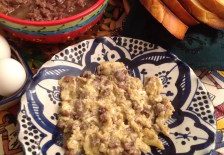Tamer Nafar: Making Palestinian Hip Hop Mainstream
By Evan Ploeckelman / Arab America Contributing Writer
Tamer Nafar and his hip hop group DAM were one of the first Palestinian rap groups to become mainstream. Born into poverty, his upbringing along with the politics of Palestine, influenced his early rap and hip hop. The fact that he was one of the very first Palestinian rappers meant that he greatly influenced much of what Palestinian rap and hip hop has become over time.
Who is Tamer Nafar?
Nafar is an Israeli-Arab who was born into poverty in the city of Lod, just outside of Tel Aviv. He discovered hip-hop when he was 17 by listening to Tupac. However, he did not know English, so he had to use an English-Arabic dictionary to translate the words. In 1997, Tamer released his first single “Untouchable” and released his first EP, “Stop Selling Drugs,” the following year which featured his brother Suhell. Shortly thereafter, they joined up with their friend Mahmoud Jreri to form the group DAM in 1999. DAM stands for “Da Arabian MC’s” along with the word dam which means “blood” in Arabic and Hebrew and daam which means “to endure” in Arabic.
Much of their early music was in Hebrew and focused on everyday themes. However, after the murder of Tamer’s friend, Booba (Hussam Abu Gazazae), DAM released their first political song, “Booba”. After the second intifada and inspiration from the Algerian French hip hop group MBS, DAM began to shift to political topics and began to sing in Arabic. These songs include “Posheem Hapim me Peshaa” (Innocent Criminals) and “Meen Erhebi?” (Who’s the Terrorist?). This focus has persisted in his music to this day.
Nafar’s Influence:
Nafar’s influence on Palestinian hip hop and rap is extensive, as he essentially pioneered the genre in Palestine. One of the biggest contributions he made to the genre was the switch from Hebrew to Arabic. Before DAM, most hip hop in both Israel and Palestine was sung in either Hebrew or English, even by Palestinians. This shift allowed Palestinians to create their own music that was distinct from Israeli hip hop.
The major themes of Palestinian hip hop and rap also began with Nafar and DAM. Many of their songs focus on the apartheid between Palestine and Israel and the situation that this forces Palestinians to live in. This includes poor living conditions, constant violence, discrimination, and calls for Palestinian unity. As a result, many subsequent Palestinian hip hop artists have created music that highlights these themes, such as Arapyat, MWR, Palestine Street, MC Gaza, and the Palestine Rapperz.
Influence Abroad:
Palestinian Rap also has extensive foreign influence, especially American influence. Nafar first learned about hip hop from listening to Tupac, so the style of DAM, and many other Palestinian artists, followed him, along with other artists from the 1970s onward. Many of the themes discussed, especially discrimination and poverty, have cemented their place in Palestinian hip hop.
This has also led to many Palestinians abroad creating music about these same topics. For example, Excentrik, a Palestinian American born in San Francisco, creates music that combines American Rap with Palestinian rap and Middle Eastern music in general. Other notable artists from the US include The Hammer Brothers, from New York, and The Philistines, from Tennessee. Palestinian immigrants in other countries have also made their mark on Palestinian rap. These include Shadi Mansour from the UK, Belly, who grew up in Ottawa, and Da Alc’z, which formed in the UAE.
However, Palestinian hip hop has distinguished itself from other forms of rap by incorporating traditional Arab music and instruments. This coincided with the shift from Hebrew to Arabic along with the shift to protest music, as this made the inclusion of Arab elements more in line with the message of the songs. DAM did this by sampling other Arab songs like “Ya tayeb al galb” by Abd al Majeed Abdalla. Another artist to do this extensively is Excentrik, who often features traditional Middle Eastern instruments in his mixes.
Nafar’s Influence on Recent Events:
Even in the most recent attacks on Palestine by Israel, we can see the impact on Palestinian hip hop. Many Palestinians have used hip hop to protest and express frustration, anger, and sadness at the state of Palestine and Palestinians. These topics echo what other groups have done before and, by being used at an actual protest in support of Palestine, show an evolution of the genre from stage performances to actual protest tools.
Please check out our blog here!


